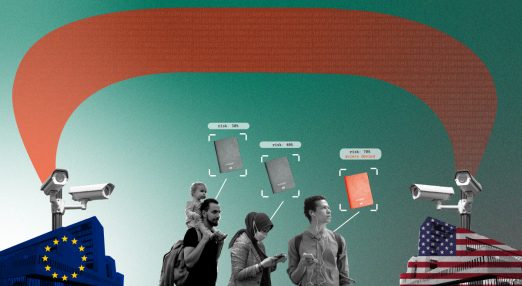USA
Filter by...
-

Snowden revelations: ten years on
Ten years ago, the first revelations about US mass surveillance were published in the UK and USA. The revelations swiftly widened to encompass details about the role of the UK’s GCHQ (Government Communications Headquarters) in the global gathering of vast amounts of communications data.
Read more
-

USA border plan requires “continuous and systematic” transfers of biometric data
Last year, it was revealed that the USA planned to launch Enhanced Border Security Partnerships (EBSPs) with other states around the world, seemingly targeting the EU, UK and Israel first. These would involve “continuous and systematic” transfers of biometric data to the USA for the purposes of immigration and asylum vetting, says a recent Council of the EU document obtained by Statewatch.
Read more
-

Surveillance by default: PATRIOT Act extended?
On 15 March, Section 215 of the USA PATRIOT Act, and several other similar legal provisions, were due to expire and begin the process of reform and review to incorporate new legal protections of privacy. However, as a result of a coordinated effort by both chambers of the US Congress, the provisions may be extended for at least 77 days.
Read more
-
Transatlantic coalition of civil society groups: Privacy Shield is not enough – renegotiation is needed
Today, EDRi joined forces with other 26 civil society organisations to send a letter to European leaders reviewing the “Privacy Shield” data-transfer agreement with a very specific message: this arrangement is not enough. The Privacy Shield is intended to allow companies to share data about customers across the Atlantic. Unfortunately, the Privacy Shield fails to […]
Read more
-
European Commission defence of European rights sinks in an unsafe harbour
Following the decision of the European Court of Justice to overturn the EU/US “Safe Harbor” Agreement last year, EU/US negotiations have been ongoing to reach a new deal, which would facilitate transfer of data across the Atlantic. Having failed to reach an agreement before 1 February, the European Commission today announced plans to back down […]
Read more
-
Why is Safe Harbour II such a challenge?
It seems baffling to many outside the Brussels bubble – and certainly our friends across the Atlantic – that reaching a revised Safe Harbour deal has proved so difficult. Part of the problem is Europe. The United States was able to negotiate a questionable deal with the EU to gain access to financial transaction data […]
Read more
-

EU-Canada agreement on PNR referred to the CJEU: What’s next?
On 25 November the European Parliament voted, by 383 votes to 271, in favour of a resolution to refer the EU-Canada agreement on Passenger Name Records (PNR) to the European Court of Justice (CJEU). The CJEU will now decide on the compliance of the agreement with EU law, in particular the Charter of Fundamental Rights. […]
Read more
-

ENDitorial: Malmström – Always there to protect US
Now that Commissioner Cecilia Malmström will be taking over as the EU’s Trade Commissioner, and as the Commissioner in charge of negotiating the controversial TTIP trade deal with the USA, it is a useful time to cast our minds back to her achievements as Commissioner with responsibility for Home Affairs in the European Union. Commissioner […]
Read more
-

TTIP: where the Good Samaritan meets the Trojan Horse
The EU and US are currently negotiating a Trans-Atlantic Trade and Investment Partnership (TTIP). The US negotiator, the United States Trade Representative, is reported to be soliciting support for inclusion of provisions from Article 230 of the Communications Decency Act (CDA) in TTIP and other trade agreements being negotiated by the US. So far so […]
Read more
-
Supreme Court of the US on cell phone searches: get a warrant
In the court case Riley vs California, the Supreme Court of the United States (SCOTUS) affirmed on 25 June what many digital rights activists have been telling a long time: Our mobile phones, especially smartphones, have become such an extension of ourselves that warrantless searches of them violate fundamental rights. Not only that, SCOTUS was […]
Read more
-
Anniversary of Snowden revelations: The year we fight back
On 5 June 2013, the Guardian published Edward Snowden’s first documents. These showed that the NSA was using a secret court order to collect millions of customers’ phone calls of the US company Verizon. Snowden’s subsequent disclosures confirmed what many privacy activists were suspecting for a long time: that the US government and its allies […]
Read more
-
UK privacy groups file complaint on medical data in Google Cloud
UK privacy groups Big Brother Watch, medConfidential and the EDRi member Foundation for Information Policy Research have filed a complaint with the Information Commissioner’s Office, the UK’s data protection authority. The complaint follows revelations that PA Consulting Group, a technology and innovation consultancy, uploaded a large quantity of data to Google’s cloud-based Big Data service […]
Read more
